This thrift store in Singapore uses AI to make buying and selling secondhand items easier and more accessible
The idea of Thryft started as a bookshelf outside a dorm. Now, Thryft has over 40,000 secondhand items listed on its website and an expansive retail space where people could visit to take in the vibes of a bookstore and vinyl record shop.
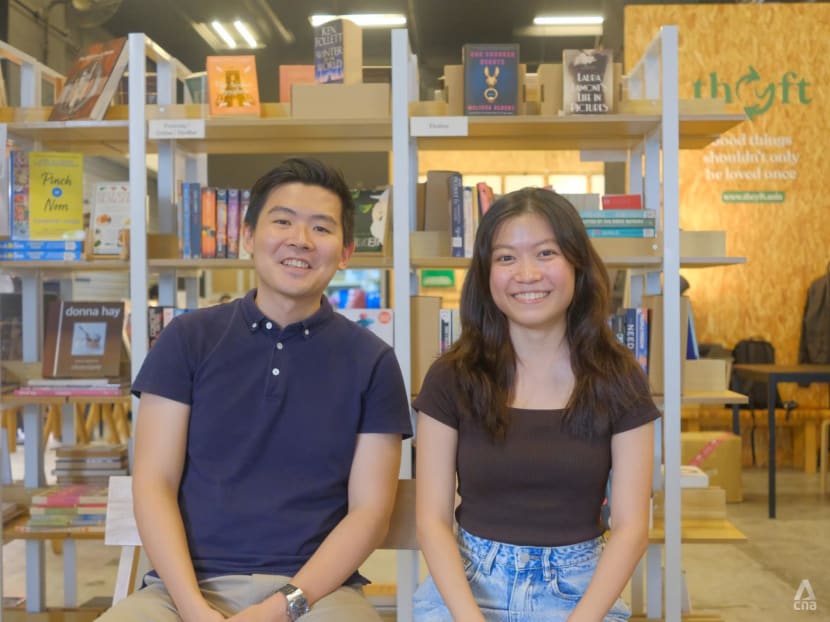
Eddie Lim and Choy Jia Yu are two of the co-founders of Thryft, a thrift store that uses AI to make the secondhand shopping experience more convenient and accessible. (Photo: CNA/Izza Haziqah)

This audio is generated by an AI tool.
So, you went a little crazy during the recent Black Friday and bought too many items you don’t need. Or you want to discard items that no longer spark joy. Perhaps you’re strapped for cash but you still need to get some last-minute birthday gifts or Christmas shopping. Or you need some items and you know secondhand works just fine.
Whatever situation you find yourself in, thrift stores can be the light at the end of the tunnel. They breathe new life into secondhand items – whether they’re impulse buys, gently used, or ready for a new chapter. Thrift stores are also treasure troves for those on a budget or eco-conscious shoppers looking to revive pre-loved items.
Thryft is one such thrift store in Singapore. With an online database that lists over 40,000 items including books, clothes and vinyl records and alongside a retail store called Thryft Hub, Thryft provides users a platform to rehome or purchase secondhand items.
What sets Thryft apart? Artificial intelligence (AI). Thryft leverages AI to handle the tedious administrative work that typically bogs down secondhand stores, such as pricing, cataloguing, and inventory management.
This automation frees up resources and allows the Thryft team to focus on other matters requiring the human touch, such as strategising the growth of the brand and coming up with initiatives like item giveaways, book clubs, and themed promotions at their retail space located in Cendex Centre at Lower Delta Road.
BUILDING ON A CIRCULAR ECONOMY ON CAMPUS
Thryft’s journey began in 2019. Five schoolmates at Yale-NUS College recognised the value of secondhand items and wanted to expand on the secondhand market they observed on campus.
“There was this group on Yale NUS’ Facebook called For Sale For Free, where students would give away stuff they didn’t need anymore, most of which were books,” said Eddie Lim, one co-founder and Thryft’s current chief executive officer.
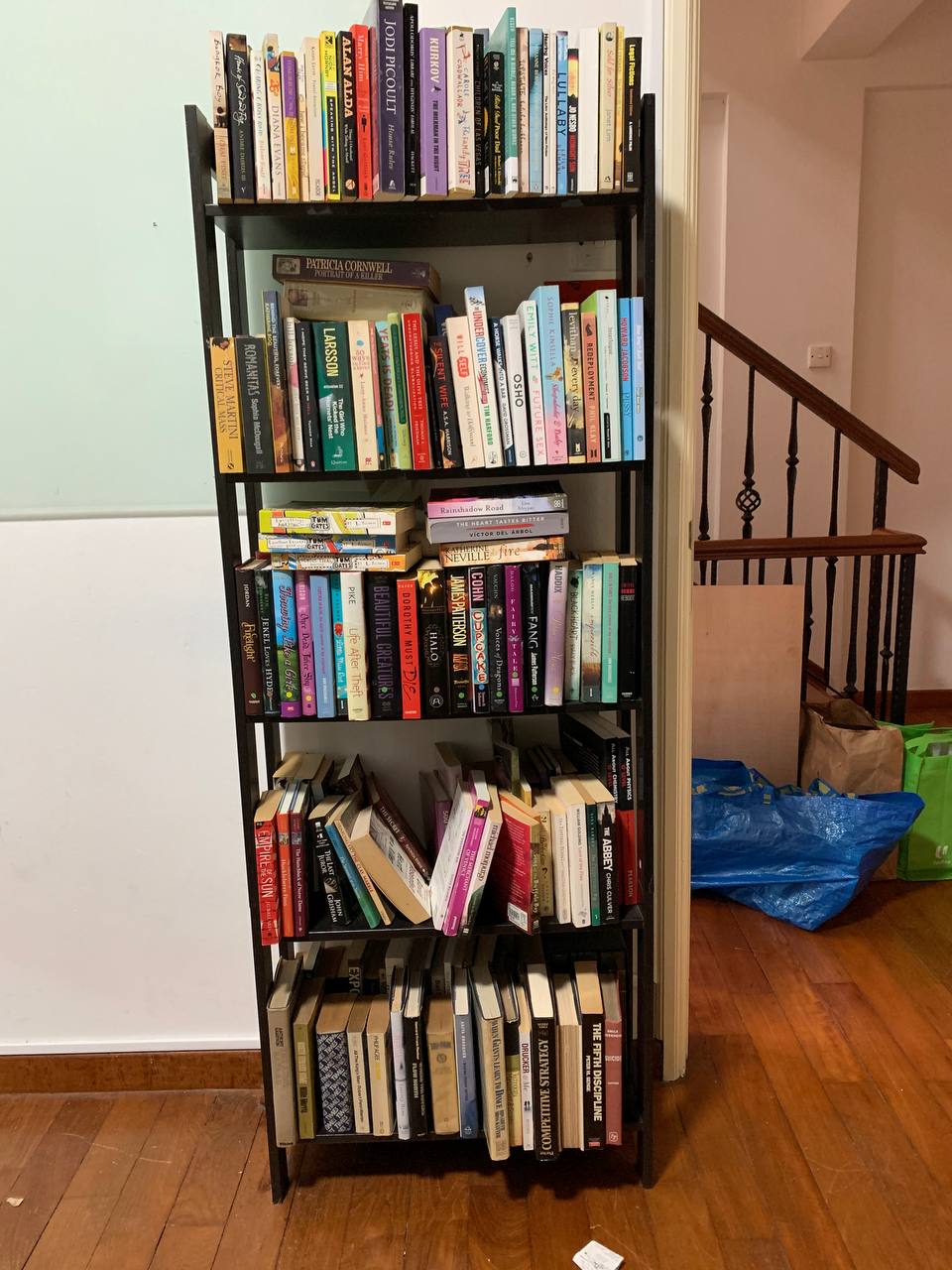
The 27-year-old added: “It was like Carousell or Olio for Yale NUS but so much better because we stayed so close to each other in dorms and we could give away or sell our stuff easily.”
From his experiences in the Facebook group, Lim realised just how much “stuff” a lot of people owned but didn’t really use anymore.
Another co-founder and Thryft’s current chief marketing officer, Choy Jia Yu, said that she too recognised the demand for secondhand items.
“I’ve always been into secondhand items, and I was inspired by my mum who was often eco-conscious in her own way,” said the 25-year-old, who majored in Environmental Studies. “I liked to figure out ways to extend the life of an item beyond its single use.”
In school, Choy and a few friends organised a few pop-up events where they collected old clothes and books, resold them, and donated the proceeds to a cause.


However, when handling the operations of these events, Choy and her friends quickly realised how tiresome the process was: “It wasn’t straightforward at all, a lot of manual work had to be done.”
She gave the example of reselling an old book. Before listing the item, the team needs to identify the publisher and genre, determine its retail price, assess its condition, look for defects, estimate a reselling price, and write a description of the book.
“It was too much work to handle,” Choy said. “Even though the demand and supply for secondhand items were there, there was a huge operational and logistical gap in between.”
Lim compared the secondhand market’s potential to large e-commerce platforms like the now-defunct Book Depository, which offered both competitive prices and convenient home deliveries. While secondhand items often come with attractive prices, the buying and selling experience often lacks convenience.
“It’s quite leceh (troublesome) to individually list down or photograph the stuff you own but wanna give away, and this doesn’t count the hassle of negotiating or the need to travel somewhere inconvenient,” said Lim. “So people just keep their stuff and let it gather dust at home.”
MAKING THE SECONDHAND MARKET MORE ACCESSIBLE
Their experiences gave Lim an idea: “What if we could make the secondhand market more convenient and efficient, such that owners can easily give away their stuff at a value, and people looking for stuff can find them easily, too?”
That’s when Lim, who majored in mathematical, computational and statistical sciences, was moved to build a tool to solve that.

With a few peers, Lim coded a basic AI-powered tool that automated much of the manual work he and Choy struggled with when listing secondhand items.
At this time, the name “Thryft” came to them and one of its early iterations included a campus drop-off point where students, staff members, and the public could leave their old books.
Using the algorithmic tool Lim developed, the books were assigned a value in "points." These points allowed users to purchase other secondhand books that Thryft listed without spending any money.
Lim refers to their AI-powered tool as the "Price Predictor", but it’s capable of much more than just pricing. Here’s how it works:
Take a photo of an old book you’d like to sell and upload it into the app. The technology then processes the image and generates key details automatically, including:
- The book’s title and publisher
- Publication date
- A brief description
- A condition rating (e.g., "Like New" to "Well Read")
- An estimated secondhand price, factoring in all these elements
- A set of “points” that users would earn from selling the book
All this happens with just a photo and a few answered questions. If the system gets anything wrong, Lim can manually correct it. With items like vintage or rare books, a lot more input may be needed, but the tech will do the heavy lifting of the administrative work.

The tool solved many of the problems Lim and Choy mentioned, and soon, the team managed to collect hundreds of books, catalogue them, and tag them with a reselling price using the tool they got.
Since its founding in 2019, the original team of five—comprising Lim, Choy, a tech expert, a business developer, and an operations lead—along with a full-time worker and several Yale-NUS student interns, expanded Thryft while managing their studies.
Initially, Thryft participated in pop-up events and collaborations with other organisations. In 2020, using their own savings and earnings from reselling books and clothes, the team rented a space to store their growing inventory of secondhand items. During the pandemic, they leveraged initiatives like startup loans from local banks, allowing them to scale further by renting more storage space to accommodate increasing donations.
A RETAIL SPACE FOR PEOPLE TO ENJOY
In late 2021, Thryft gained traction through Instagram and word of mouth. This publicity helped them secure funding from angel investors, enabling the team to move to a larger warehouse and host pop-up events at venues like The Projector and Coronation Plaza throughout 2022.
Over the years, Lim and the team enhanced the tool’s accuracy and automated additional functions. For example, once an item is photographed, it is automatically uploaded to Thryft’s backend system and added to the database without any manual input.
After verification, the AI updates the data and lists the item on the Thryft website, making it ready for users to browse and purchase online
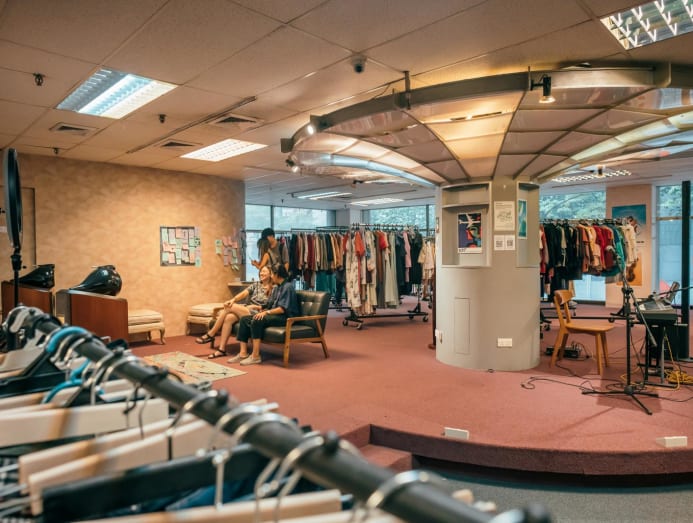
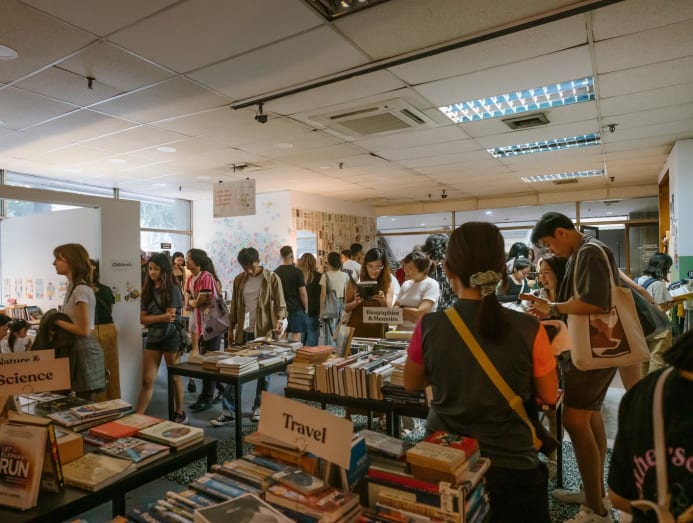
By the end of that year, most of the founding team had graduated and moved on to other pursuits, leaving Lim and Choy as the remaining co-founders to lead Thryft’s growth.
In 2023, after years of pop-ups, Thryft opened its first retail space at Peace Centre, which operated for five months until Jan 2024, when the mall closed down.
While having an entirely online space may seem more economically sound and efficient, Lim and Choy emphasised the unique value of having a physical store where customers could experience the "vibes" of a secondhand shop.
There, people need not wait for pop-up events. The space allows people to sift through various books, clothes and children’s items, and be surprised by the “treasures” they can find in another person’s “trash”.
When Peace Centre closed in January 2024, knowing that they needed another retail space, Lim and Choy soon found another home at Lower Delta Road and opened in September.
The space is expansive, with shelves brimming with books across various genres – from travel non-fiction and political memoirs to young adult fiction and children’s storybooks.
There are also racks of jeans in various colours and sizes, alongside dresses, blouses, and tops suitable for both parties and workwear.
Thryft has come a long way. Beyond the familiar shelves of books and racks of clothes seen at their pop-up events, the retail space features unique additions like a display wall showcasing secondhand vinyl records, a recent addition to their inventory. Visitors can even play these records on a turntable tucked in the corner.
Another interactive feature of the space is a large set of tables with papers plastered onto them in the centre of the store. Here, visitors could pick up pens or markers to draw anything they’d like or respond to the questions written on the paper, like “Why do you shop secondhand?” or “What do you do for the environment?”
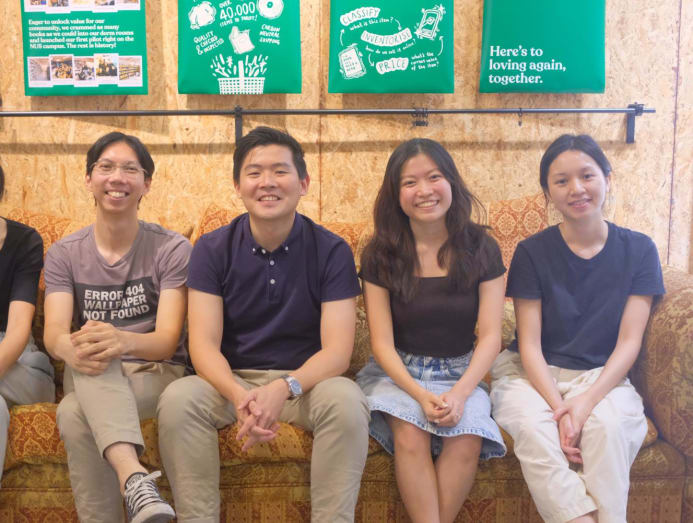
There’s also a cosy corner featuring rare and vintage books, some dating back to the early 1900s. Next to them are vintage comic books, well-maintained and carefully restored for the next owner to marvel at.
Throughout the store, there are also inviting nooks and seats that provide a space for visitors to slow down, pick up a book, and simply read or relax.
People can also drop off their items at the store. Thryft accepts books, clothes, vinyl records, card and board games, console games, children's toys, selected sporting goods categories, and selected electronics, based on their guidelines.
For those who'd like the convenience, you can opt for the courier pickup, where the Thryft team will collect your items from your house for $10 per box (up to 10kg), simply by filling up a form on their website.
Using their AI tool, Thryft can identify the items and assign an estimated reselling price. In return, you’ll receive the equivalent dollar value of your items in Thryft credits via a gift card, which can be used to purchase other secondhand items in their online or physical store.
“A lot of people say they want to buy secondhand for all kinds of reasons, whether it’s to save money or be more eco-conscious, but the problem was that people didn’t know where or how,” Lim said.
“We hope Thryft can get people to shop secondhand without burning out with the laborious manual and administrative tasks," he added. "Instead, they can focus on the joy in finding pre-loved treasure."





